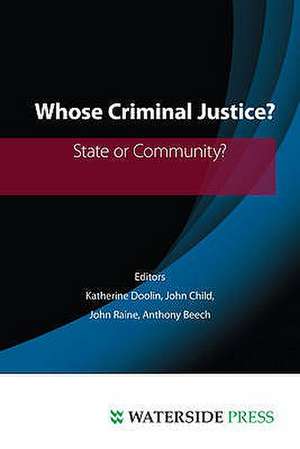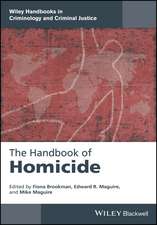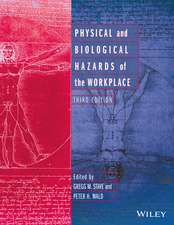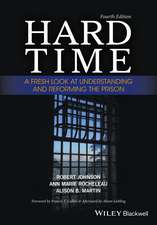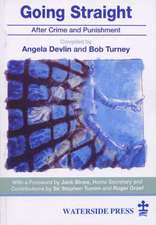Whose Criminal Justice?
Autor Katherine Doolin, Doolinen Limba Engleză Paperback – 20 feb 2011
Preț: 317.43 lei
Nou
Puncte Express: 476
Preț estimativ în valută:
60.74€ • 63.42$ • 50.27£
60.74€ • 63.42$ • 50.27£
Carte tipărită la comandă
Livrare economică 04-18 aprilie
Preluare comenzi: 021 569.72.76
Specificații
ISBN-13: 9781904380627
ISBN-10: 190438062X
Pagini: 290
Dimensiuni: 156 x 234 x 15 mm
Greutate: 0.41 kg
Editura: Waterside Press
ISBN-10: 190438062X
Pagini: 290
Dimensiuni: 156 x 234 x 15 mm
Greutate: 0.41 kg
Editura: Waterside Press
Notă biografică
The University of Birmingham Community and Criminal Justice Group: Established in 2008, The BCCJ Group began life by chance when two academic colleagues - one a forensic psychologist, the other a public management specialist - began talking to each other on their daily train commute into the University of Birmingham. Recognising the considerable, but much dispersed, expertise and interest in criminology, criminal law and justice across the Birmingham campus, for example, in the Schools of Law, Social Policy, Government and Society, Psychology, Economics and Medicine, the idea was to form a cross-campus and cross-disciplinary group to exchange ideas, develop joint research projects, organize conferences and other events together and, by working closer together, helping to highlight and promote Birmingham's exceptional expertise in the field of community and criminal justice. The initiative was strongly supported and driven forward by the efforts of Deputy Pro-Vice Chancellor, Professor Stephen Shute, who was then Director of Birmingham's Institute of Judicial Administration. Since then, the Group has hosted an annual conference for doctoral researchers and staff; it has encouraged and supported staff collaborations on various research bids, and most recently, it has provided the authorship for an edited book 'Whose Criminal Justice: State or Community?' (to be published in 2011 by Waterside Press). For further information on the Birmingham Community and Criminal Justice Group, please contact: Anthony Beech, Professor of Criminological Psychology, School of Psychology, University of Birmingham, tel: 0121 414 7215 or a.r.beech@bham.ac.uk or John W Raine, Professor of Management in Criminal Justice, School of Government and Society, University of Birmingham, tel: 0121 414 5008 or j.w.raine@bham.ac.uk or Andrew Sanders, Professor of Criminal Law and Criminal Justice, School of Law, University of Birmingham, tel: 0121 414 6318 or a.h.l.sanders@bham.ac.uk or Basia Spalek, Reader in Communities and Justice, School of Social Policy, University of Birmingham, tel: 0121 414 8027 or b.spalek@bham.ac.uk Contributors Shamila Ahmed is a Doctoral Researcher in the Institute of Applied Social Studies, School of Social Policy, University of Birmingham. Anthony Beech is Director of the Centre for Forensic and Criminological Psychology and Professor of Criminal Psychology in the School of Psychology, University of Birmingham. Mark Blandford is a Detective Constable with the Staffordshire Police Public Protection Unit and Associate of the School of Psychology, University of Birmingham. John Child is a Lecturer in Law at Oxford Brookes University. He was a Doctoral Researcher and Postgraduate Teaching Assistant in the Law School, University of Birmingham. Katherine Doolin is Director of the Institute of Judicial Administration and Lecturer in the Law School, University of Birmingham. Jessica Elliott is a Lecturer in Law at the University of the West of England. She was a Doctoral Researcher and Postgraduate Teaching Assistant at the Law School, University of Birmingham. Kathryn Farrow is a Lecturer in the Institute of Applied Social Studies, School of Social Policy, University of Birmingham. Nathan Hughes is a Teaching and Research Fellow in the Institute of Applied Social Studies, School of Social Policy, University of Birmingham. Adrian Hunt is a Lecturer in the Law School, University of Birmingham. Paul Keasey is a Chief Inspector with West Midlands Police and Doctoral Researcher in the Institute of Local Government Studies, School of Government and Society, University of Birmingham. Gill Kelly is an Independent Trainer at KWP and Associate of the Institute of Applied Social Studies, School of Social Policy, University of Birmingham. Zahira Latif is a Doctoral Researcher in the Institute of Applied Social Studies, School of Social Policy, University of Birmingham. Theresa Lynch is a Doctoral Researcher and Postgraduate Teaching Assistant in the Law School, University of Birmingham. David Prior is a Senior Research Fellow in the Institute of Applied Social Studies, School of Social Policy, University of Birmingham. John Raine is Professor of Management in Criminal Justice and Director of the Institute of Local Government Studies, School of Government and Society, University of Birmingham. Andrew Sanders is Professor of Criminal Law and Criminology in the Law School, University of Birmingham. Basia Spalek is a Reader in Communities and Justice in the Institute of Applied Social Studies, School of Social Policy, University of Birmingham. Bernadette Wilkinson is an Independent Trainer at KWP and Associate of the Institute of Applied Social Studies, School of Social Policy, University of Birmingham.
Cuprins
1. Introduction: The Changing Politics of Law and Order Part 1: THE REGULATORY STATE AND THE MANAGEMENT OF RISK 2. Limiting Criminal Justice and Regulation: The 'Freedom' Perspective 3. Risk, Pre-Emption, and the Limits of the Criminal Law 4. Criminalising the Purchase of Sexual Services: The Use of Strict Liability as a Form of Risk Management? 5. The ASBO: Regulating Behaviour and Manipulating Law 6. Managing Risk and Changing Priorities for Probation Practice and Youth Justice 7. (In)Security, Risk, Muslim Communities, Policing and the 'New Terrorism' Part 2: EMPOWERED COMMUNITIES AS LOCAL STAKEHOLDERS IN CRIMINAL JUSTICE 8. Empowering Communities Through Restorative Justice 9. Safer Communities and Community Justice 10. Community Justice and the Courts - A Step Forwards, Backwards or Sideways? 11. Intolerant or Intolerable?: Antisocial Youth in Asocial Communities 12. Policing Sexual Offenders in the Community: Is it Time to Move from the Invisible to the Visible? 13. Towards a Community ReSponse to the Perpetration of Domestic Violence 14. Conclusions and the Way Forward for Criminal Justice
Recenzii
'This is an extremely comprehensive text that has been written and constructed in an accessible way for students of this subject. The focus on risk, risk management and actuarialism in Chapter three provides a well-rounded and persuasive discussion over the extent of control and risk strategies. The issue of rights and liberties is maintained as a dominant thread throughout and readers are presented with a critical enagement with the practical, political and conceptual realities of modern criminal justice': Paul Taylor, University of Chester. 'This collection represents a timely discussion of one of the key issues facing criminal justice over the next decade: namely how to reconcile the new drive for localism with the need to ensure fairness and efficiency in an increasingly complex criminal justice system': Stephen Shute, Head of Sussex University Law School 'Provides a thoughtful and principled perspective on criminal justice at a time when the country seems ready to move on from the rigid attitudes and misguided assumptions that have dominated policy and practice for almost 20 years ... Policy makers and practitioners would do well to reflect on the wisdom that is contained in this book': David Faulkner, University of Oxford Centre for Criminological Research. Read the full review 'I found this text extremely useful in the consideration of this debate and it provides a number of thought provoking elements. An example being the focus upon the potential increase in security measures as a consequence of the perceived rise in the terrorist threat. It is not possible to investigate, just as it is not practical to prosecute, every perceived crime. As a result justice is a matter of choice and I found this text extremely helpful in exploring the concepts that result from such choice in terms of the tension between parochial and central influence': Peter Hall, Senior Lecturer in Forensic and Investigative Studies, Coventry University
